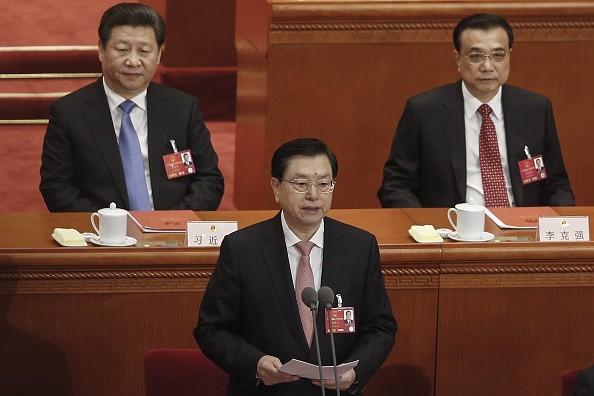China’s third highest official said on Wednesday that Beijing is aware of problems in Hong Kong and would respect the city’s autonomy as protesters hit the streets to oppose the mainland’s attempts to curtail local freedoms.
"The argument that the Central Government is trying to turn Hong Kong into mainland (China), or to turn 'one country, two systems' into 'one country, one system' is totally baseless," Zhang Dejiang said during an evening banquet held in his honor.
Zhang's unexpectedly forthcoming remarks come at a time of mounting political tensions in Hong Kong, as tens of thousands of people mounted a massive but ultimately unsuccessful push to pressure Beijing to grant full democracy during the "Occupy Central" street demonstrations in late 2014.
Thousands of police were deployed across Hong Kong, preventing protesters from coming in close proximity to Zhang as he visited a science park and a harbor front exhibition center where he addressed an economic summit.
Zhang conceded that a small minority of people in Hong Kong are pushing for its independence, but said China would "unswervingly" maintain the current "one country, two systems" model of governance for the city, which guarantees a high degree of autonomy in Hong Kong since it switched from British to Chinese rule in 1997.
Zhang also addressed the rising trend of radical activists forming political groups and staging disruptive protests to call for greater Hong Kong nationalism and even independence from China, an issue that may soon see more mainstream attention once city-wide legislative council elections are held later in September this year.
Hong Kong independence is strongly opposed by Beijing, which fears any separatist or sweeping democratic demands spilling into the mainland may occur under its rule.
Zhang stressed the rule of law as a "core value" and if that were compromised, "how do we continue the prosperity and stability?"
"I hope the SAR government and the judiciary would firmly fulfill the solemn duty to safeguard the rule of law," he said.
A feature of Zhang's visit has also been repeated pledges of a more engaged government actively listening to public concerns about Hong Kong's relationship with China.
"For the problems that are being exposed now, some are new and some have been around for years and there won't be an immediate solution. But we can't question, feel hesitant, or even deny 'one country, two systems' because of that," Zhang said.
Despite a massive police presence, small, scattered groups of protesters marched on the streets at various locations demanding Beijing to respect the city's freedoms.
Massive yellow banners were unfurled demanding full democracy and universal suffrage, while others have held up black banners calling for China to stop its "dictatorial rule" and to "stop interfering with Hong Kong affairs."
A few others have burned a portrait of Zhang and demanded for him to "get the hell out of Hong Kong."
"We want an end to the Chinese Communist Party dictatorship," Avery Ng Man-yuen, chairman of the League of Social Democrats, told the South China Morning Post on Thursday. "People here are very dissatisfied with the government."
Some pro-Beijing groups, however, slammed the pro-democracy activists for jeopardizing Hong Kong's economic interests by opposing the mainland, and held up blue banners with the words: "Oppose splitting up Hong Kong."
Zhang, head of the Standing Committee of the National People's Congress and Beijing's point person on Hong Kong affairs, left Hong Kong on Thursday afternoon.



























